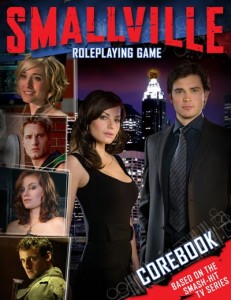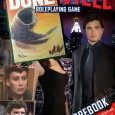 GM: Carl Rigney
GM: Carl Rigney
Players: Sean Nittner, Karen Twelves, Dennis Jordan and Regina Joyner
System: Smallville
So first off props to Carl for running the Breakfast Club. I was a little surprised we didn’t start off in detention, but the game was still quite reminiscent. I know it is the nostalgia factor, but I still love that movie.
The plot isn’t surprising at all but that didn’t make it less awesome. Smallville take place in a tiny little town where the protagonist Clark is raised by good people that teach him to be an exceedingly moral character. Franklin (Frankville?) on the other hand is a dumpy little Kansas town that everyone is trying desperately to get out of! In this it reminded me quite a bit of Rock n’ Roll Dreams, a DiTV game that Carl ran a few times in 2008. In that game we were all trying to get out of town, but only the winner of the drag race would make it. In Breakfast League, we’ll we had a bit more leeway.
I don’t want to go into to many details because I can see Carl running this game several more times, and even though we didn’t see ALL the reveals, the ones we did were plenty revealing…
What I can talk about, because it was driven pretty much exclusively by the players was our interactions. Two boys, who ostensibly didn’t get along and two twin sisters who shared nothing but apathy for each other. Quickly however, events in the game catalyzed and explosive growth in both relationships. The boys became immersed in their own doubts and the wrongness of their lives, while the girls were having a blast experimenting with their powers and trying to figure out who else had them, and what they could do.
One particular interaction was captured in several mediums:
- From a twitter account: “Let’s trick Jaime to stand in front of a train to see if he has super powers!” #minicon
- From an email from Carl after the game: Also, if Chase asks “Hey, how invulnerable ARE you? Like, what would an atom bomb do?” do NOT go along with her plan. It will probably not end well.
- From my memory of the game “Admit it Chase! You dumped me when I was UNDER A CAR THAT JUST HIT ME!”
All in all, we had a grand time.
What rocked
Dennis and I played the boys trying to muck through their messed up lives. Both of us got really “hurt” in the game (my stress levels were all over the place) because of the issues we tackled. Jamie (my character) went as far as trying to blow his brains out. It didn’t work, but it was a fun place to take the Lead. Woot! Teen angst!
The girls were hilarious. The raced across town using their super powers and went from totally apathetic to giddy with excitement.
As always, Carl delivers all the right goods. Where my game required me to distill down a tome of information, Carl summed up his settings in about 30 seconds. Where I started the game with larger than life conflicts, Carl executed teenage drama that started with a party by the quarry and snowballed into a Thelma and Louise style vigilante escape from the law and from our old lives.
What could have improved
As with my game, I felt Smallville lacked good instructions for how to end conflicts with stress. Giving is easy to understand, taking stress isn’t clear. Do you just add a beat in a different scene and come back to the conflict? That seems really drawn out. I’d like some examples.
Honestly, I know Smallville is the story of a hero’s beginning, but I wonder if it doesn’t actually “work” better for more established characters. The characters in Duneville ALWAYS knew who they were fighting for. In the Breakfast League we hit a couple times where figuring out “who” something was done for was kind of difficult. For instance: calling my dad to get him to do me a favor that would help me get recognized by a basketball scout. Who was this for, or against? For me but that doesn’t count. Against my dad perhaps, but I didn’t have him as a relationship. Eventually I said it was about impressing the coach, but even that felt a little week.


Ending Conflicts
It’s not clear to me exactly what your issue is with ending conflicts with stress.
As soon as Stress is taken, the conflict is over. If you want to initiate another conflict, go for it! If you can explain a bit more what the question is, maybe I can answer it.
We play it basically like a tennis match, if you’ll allow that the analogy doesn’t include methods of scoring.
So the conflict goes back and forth and back and forth and boom, someone takes stress.
Then the person with stress either needs to Give In or start a new conflict. If you want, you can cut away from that scene and back to it, but the onus is on the loser to initiate the next proactive stage of action.
Ah, this is a good analogy. Each time someone takes stress it isn’t the end of the conflict (unless they are stressed out), it’s just a “score” for the other side.
Still, that means conflicts may take a lot longer than I want to be rolling dice, especially if both sides are determined not to give. But I have this problem in Dresden as well. Sometimes I just want one die roll to resolve the conflict and save the serious back and forth for the big stuff. I think I might ask the Leads to have “tests” with each other as well as contests, for the little crap. I often just do a contested maneuver roll in Fate for small stuff. Whoever puts the aspect on the other person “wins” for small conflicts.
Well, you have the option to Stress the opposition Out if you beat them by a lot. Personally, I tend to consider this a mandatory occurrence rather than a player choice. Sometimes, you hit too hard and can’t control the results. Oops.
Tests also work for small things, and you have leeway in the rules to inflict stress for them, so I think you’re golden if you go that way.